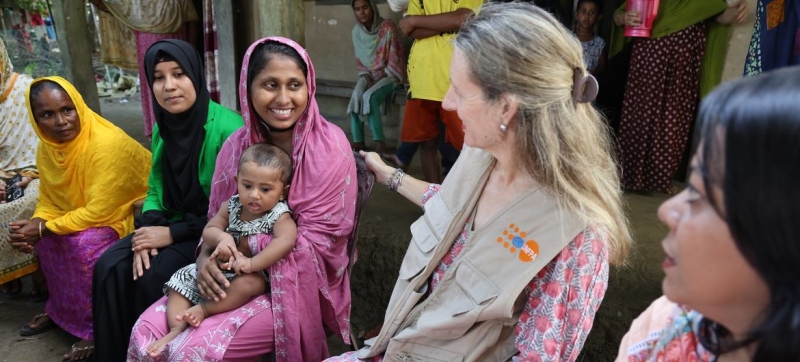- Overnight rain floods Chattogram, causes traffic chaos |
- Khagrachhari violence: 3 cases against 1, 000 unknown people |
- Durga Puja ends today thru immersion of idol |
- Bay Deep depression likely to cross Odisha by Thursday night |
- Human Rights Groups Urged to Unite Against Racism |
Preparing for Floods: Safeguarding Women’s Health in Bangladesh

Anima Akhter, 24, proudly introduced her seven-month-old son to UNFPA Representative Catherine Breen Kamkong during a community visit to Bodipur village.
Climate change has intensified monsoon flooding in Bangladesh, putting women of childbearing age at greater risk — but the UN reproductive health agency (UNFPA) is helping them prepare, reports UN News.
Sunamganj, a district in the wetland ecosystem of northeast Bangladesh, is especially vulnerable to climate change. Floods there arrive quickly, last for weeks, and disrupt daily life, displace families, and cut off access to essential services.
For over 670,000 women of reproductive age living in the area, increasingly extreme weather events threaten their access to reproductive healthcare. To help, UNFPA is training women to protect themselves and their children during floods.
Shakila Akhter, a 24-year-old mother of two, was eight months pregnant during the last flood.
“Thanks to the training I received, I knew what to carry, how to prepare, and how to protect my family,” she recalled. She now uses family planning tools she hadn’t known about before: “I want to choose when I’m ready for another child.”
She also drew a clear link between climate change and worsening floods:
“We understand that the climate has changed over the past 20 years. In Bangladesh, the flood season has become longer, sudden floods are more frequent, heatwaves have intensified, and winters are now shorter. We must all be prepared to manage this to survive.”
This preparedness is made possible by volunteers trained to help others cope with climate shocks.
Shakila Begum, 26, began volunteering after just two days of training. She works with the Climate Resilience Health System and Community initiative — supported by UNFPA and the Swedish International Development Cooperation Agency — which educates women on issues from menstruation to childbirth during floods.
Begum is now a point of contact for 75 families, offering support on family planning and maternal health.
“One woman had dangerously high blood pressure just before giving birth,” she said. “I advised her family to go to the local hospital, where she safely delivered — completely free of cost.”
The initiative also offers safe spaces where women can learn about sexual and reproductive health.
In Kurban Nagarn, volunteers host “street dramas” tackling issues such as maternal health, disaster preparedness, and child marriage prevention. More than 500 people attend each performance.
Taskira Hauque Tazin, a student and key member of the theatre group, has represented Bangladesh in conferences both at home and abroad.
“I feel proud to work for women’s empowerment and to support underprivileged communities,” she said. “Through these plays, we raise awareness so women don’t fall behind. We want to stop early marriage, promote girls’ education, and ensure access to maternal healthcare. Whether it’s in the sun, rain, or storm — we’ll keep doing this work for the people.”
Anima Akhter, a mother from Kurban Nagarn, explained that the street dramas provide a safe space for difficult conversations:
“We want to share our problems, especially about our bodies — but we often can’t speak.”
With support from local volunteers, she safely delivered her youngest child in a hospital. Her husband, Nurul, now joins community sessions and encourages other men to take part in health awareness.
“Since my wife received training, I took it very seriously,” he said. “I talk with other men at the tea stall, urging them to be prepared for disasters and to take precautions, especially for pregnant women’s deliveries and family planning.”
Despite these efforts, challenges remain. In Sunamganj’s flood-prone villages, over half of births still take place at home. Many women and girls feel shame discussing menstruation, and cultural norms often limit women’s economic independence. Climate-related disasters amplify these vulnerabilities.
From 28 to 31 July, global experts gathered in Brasília at the Global Symposium on Climate Justice and Impacted Populations, co-hosted by UNFPA and the Government of Brazil. The event called for gender-inclusive climate policies and stronger recognition of climate change’s impact on sexual and reproductive health.
Diene Keita, Acting Executive Director of UNFPA, stressed, “Climate change is increasing the risk of maternal mortality, disrupting access to contraceptives, and heightening the risk of gender-based violence. Our collective efforts must strengthen the resilience of women, girls, and health systems to adapt to climate shocks. Preparedness, rapid response, and building forward better must be at the core of our work.”

